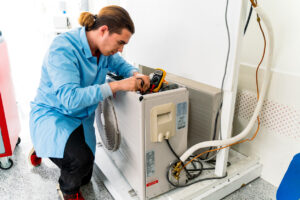Our homes should be a haven during hot summer months — a place to escape dangerous heat and humidity and a location where people can stay comfortable.
Indoor Air Quality and Humidity
While homeowners give a lot of thought to the temperature inside during the summer, they often forget about the quality and condition of their air. Indoor air quality is greatly affected by humidity levels. Increased humidity can decrease comfort significantly more than temperature alone.
“When there is too much humidity in the air, skin often feels clammy, sweaty, or sticky,” explains Craig Elliott, owner of National Indoor Climate Experts (NICE) in Springfield. “Musty-smelling odors, mold, and mildew begin invading the living space, and the house becomes a breeding ground for termites, cockroaches, and other pests”.

High indoor humidity can also damage wood furniture, floors, trim, and musical instruments in the house.
Some people’s health suffers as well, with humidity leading to an increase in symptom severity for individuals with asthma or other respiratory issues.
How To Control Indoor Humidity During the Summer
This is the time of year when moisture builds to uncomfortable levels. Here’s what you can do to treat the problem of too much humidity:
- Use ventilation fans in kitchens and bathrooms when in use. Ensure your fans are venting directly outside.
- Cover dirt floor crawl spaces under your house with plastic to act as a vapor barrier. Check to make sure your dryer is vented to the outside.
- Ensure air conditioning drip pans are clean and drain lines unobstructed. Fix any water leaks in pipes, toilets, showers, etc. Clean and repair roof gutters regularly — use covers to keep leaves and sticks from building up in the gutters.
- Make sure the ground slopes away from the building foundation so that water does not enter or collect around the foundation.
- Use downspout extenders that carry water at least 6 feet away from the foundation. Seal unwanted air leaks, such as around holes for plumbing and wiring, as this is where humid outside air sneaks into the home.
- Use whole-home ventilation to keep the air in your house fresh. Dehumidify the air in your house. Use a dehumidifier in addition to your air conditioner to pull out excess moisture that your air conditioner alone can’t handle.
In addition to ventilation, controlling the humidity level in your home is a significant factor in air quality and comfort in general.
If you or members of your family are experiencing any of the health and comfort issues associated with summer humidity, call (571) 946-5616.
 SEE OUR SPECIALS
SEE OUR SPECIALS SCHEDULE SERVICE
SCHEDULE SERVICE




 Call 703-884-2376
Call 703-884-2376


